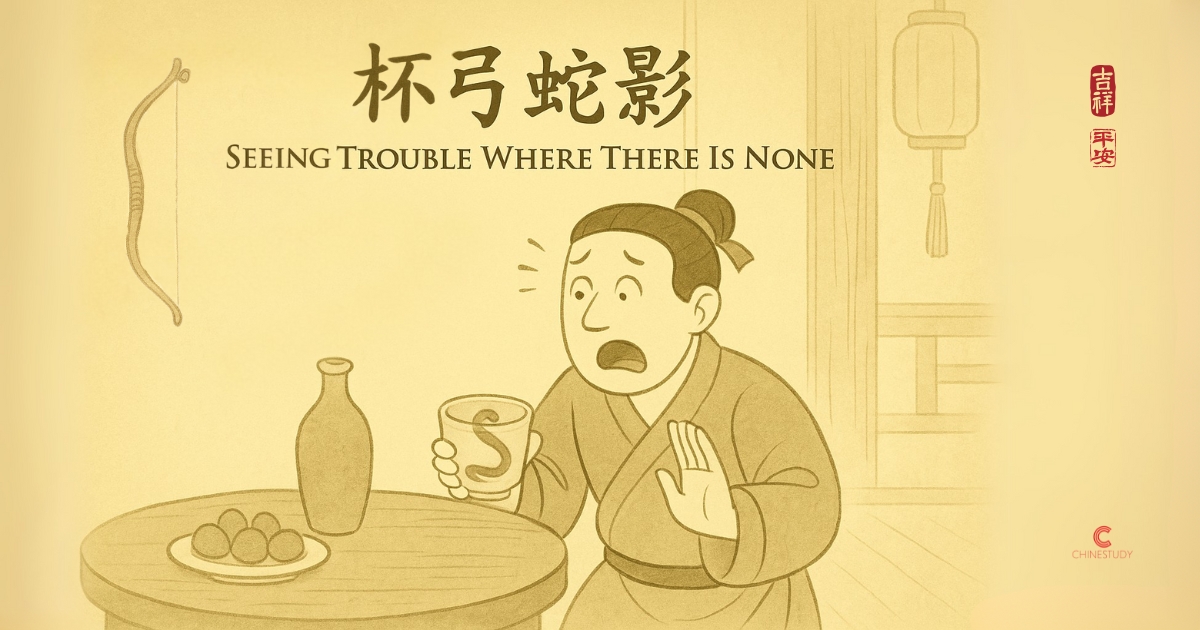🐍 杯弓蛇影 bēi gōng shé yǐng – Seeing Trouble Where There Is None

🔍 What It Means
杯弓蛇影 (bēi gōng shé yǐng) literally means “a bow’s shadow in a cup looks like a snake.”
Word-for-word:
- 杯 (bēi) – cup
- 弓 (gōng) – bow
- 蛇 (shé) – snake
- 影 (yǐng) – shadow
This idiom describes a person who gets scared or suspicious for no real reason — imagining danger where there is none.
In English, it’s like saying:
- 🕳️ “Making a mountain out of a molehill”
- 👻 “Jumping at shadows”
- 😱 “Letting your imagination run wild”
🏺 Where It Comes From
This idiom comes from a story during the Han Dynasty.
A man was drinking at a friend’s house.
As he raised the cup, he saw a snake inside the wine — but he didn’t want to be rude, so he drank it anyway.
Later, he felt sick for days.
When he told his friend, they looked around…
It turns out, the “snake” was just the reflection of a bow hanging on the wall.
The sickness was caused not by wine — but by his fear.
That became a metaphor:
Sometimes, fear and stress come from what we think is real… not what actually is.
💬 How to Use It
Use 杯弓蛇影 when someone becomes scared, suspicious, or anxious — but only because they misunderstood something.
- ❌ It’s not about real threats — it’s about imagined ones.
- ✅ Often used when a person panics too quickly or overreacts.
🎯 Real Examples
1. 听到一点声音,他就怀疑家里进贼了,真是杯弓蛇影。
- Tīng dào yì diǎn shēngyīn, tā jiù huáiyí jiālǐ jìn zéi le, zhēn shì bēi gōng shé yǐng.
- 👉🏻 He heard a small noise and thought it was a thief — totally overreacting!
2. 医生说没问题,他还一直担心,是不是杯弓蛇影了?
- Yīshēng shuō méi wèntí, tā hái yìzhí dānxīn, shì bú shì bēi gōng shé yǐng le?
- 👉🏻 The doctor said everything was fine, but he kept worrying — maybe he’s just imagining things.
⚠️ Common Mistakes (Watch Out!)
❌ Mistake: Using it to describe real fear about actual danger
✅ Correct: It’s about fear that comes from misunderstanding or false belief
💡 Memory Tip

Imagine raising your teacup and seeing something strange inside — a snake!
You freeze. You worry. You feel sick.
But it was never a snake — just a shadow.
That’s 杯弓蛇影 — when your mind makes things scarier than they are.
🧩 Interactive Practice
Translate this sentence into English:
- 你别杯弓蛇影了,真的没事。
Answer:
Don’t overthink — it’s really nothing.
🌟 Final Thoughts
We all worry sometimes — but not every shadow is a snake.
杯弓蛇影 reminds us that fear can grow from misunderstanding.
🧐 Before reacting, ask yourself: is it a real danger… or just a shadow in the cup?
👉 Stay tuned for the next idiom in this series!
Thank you for subscribing!
Have a great day!